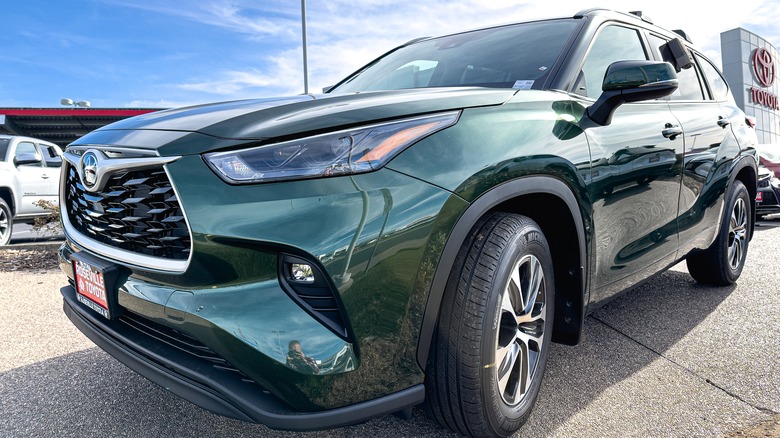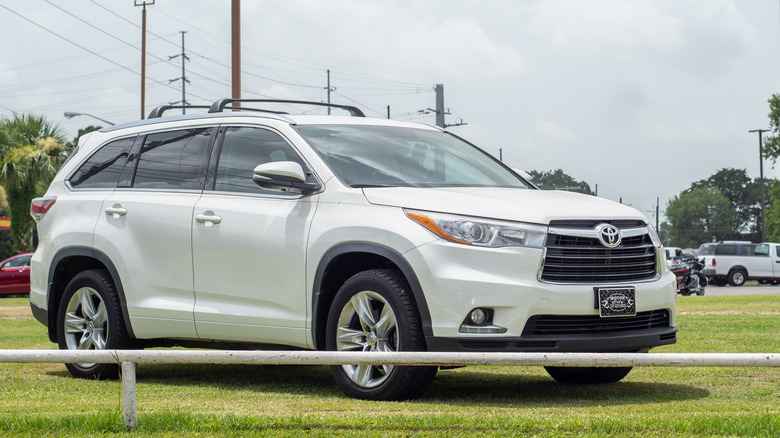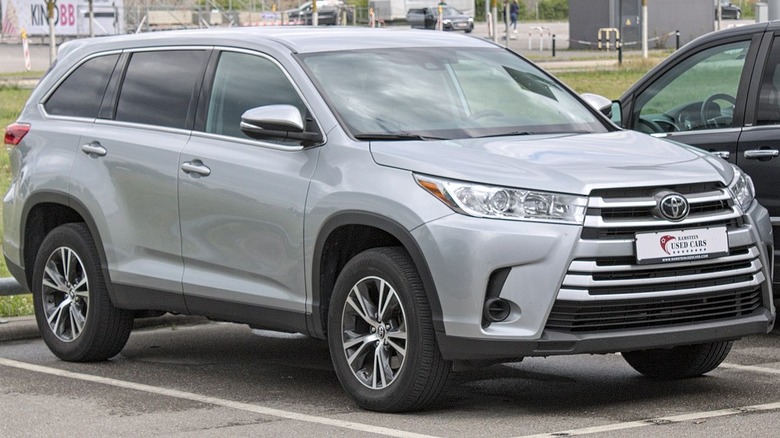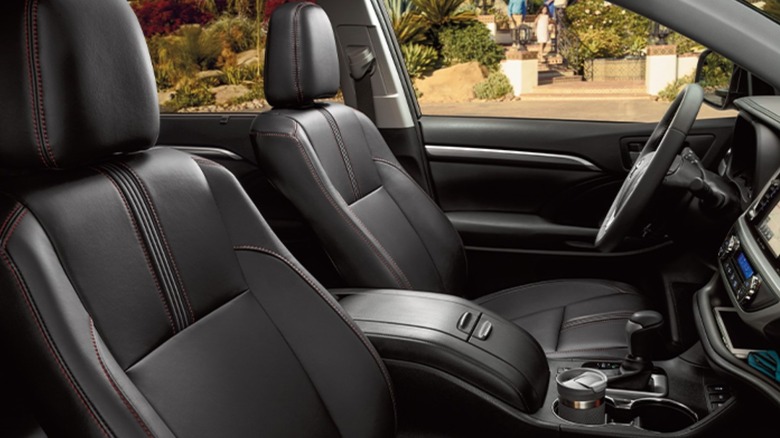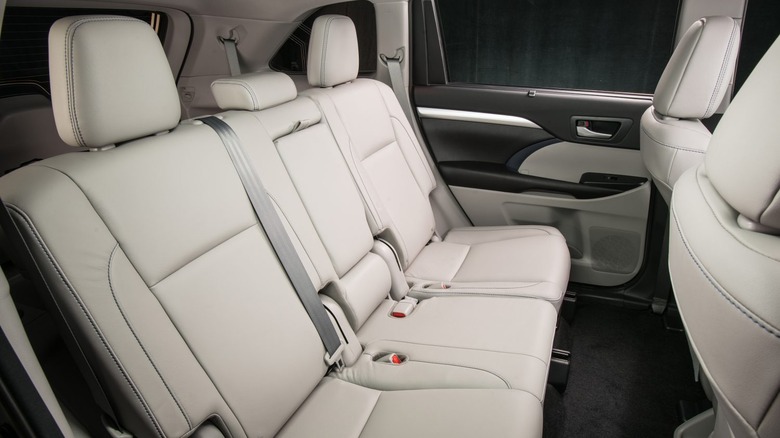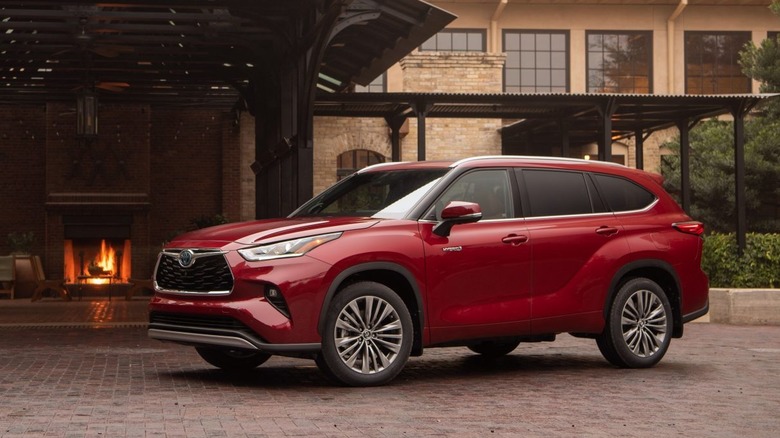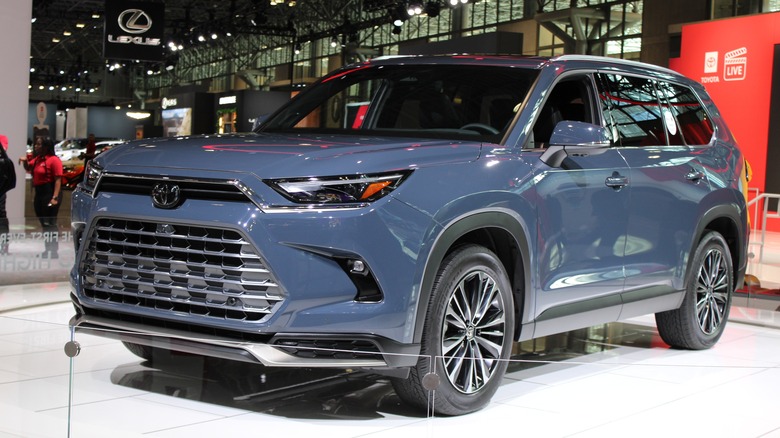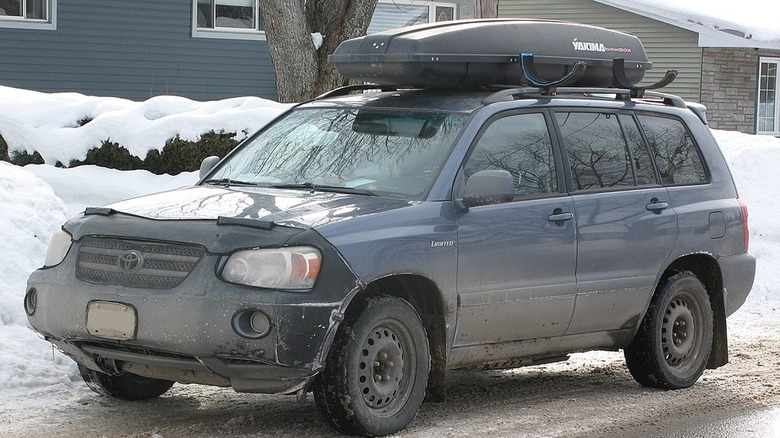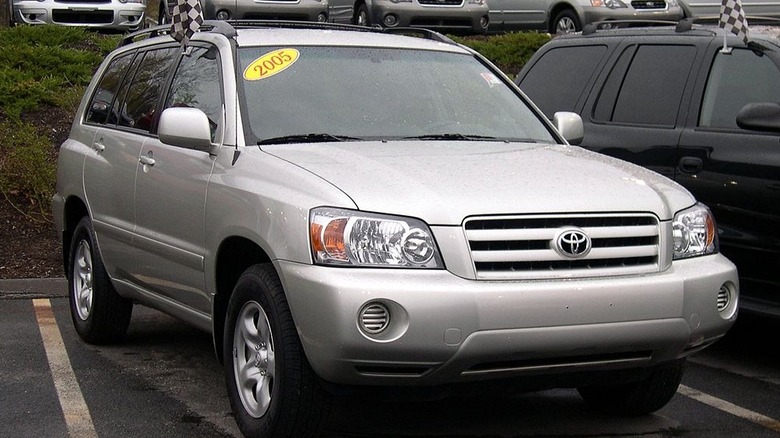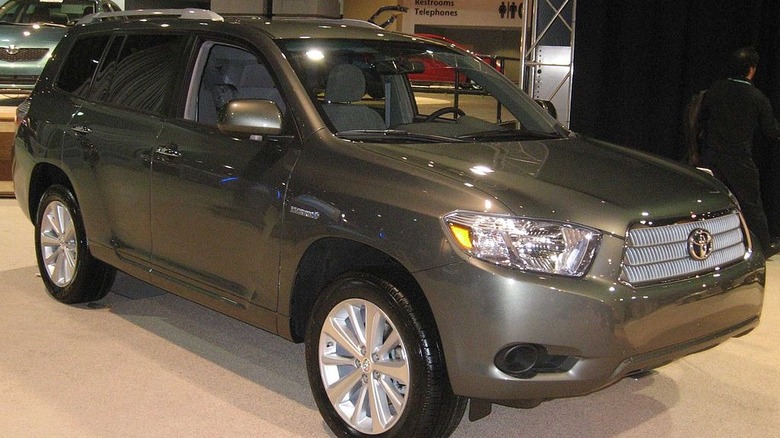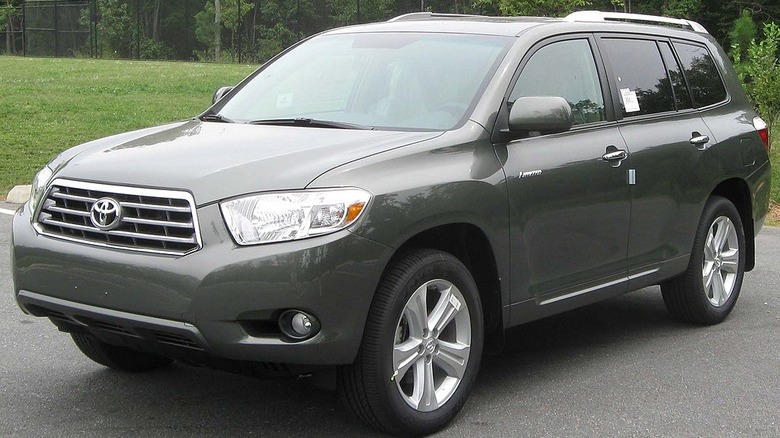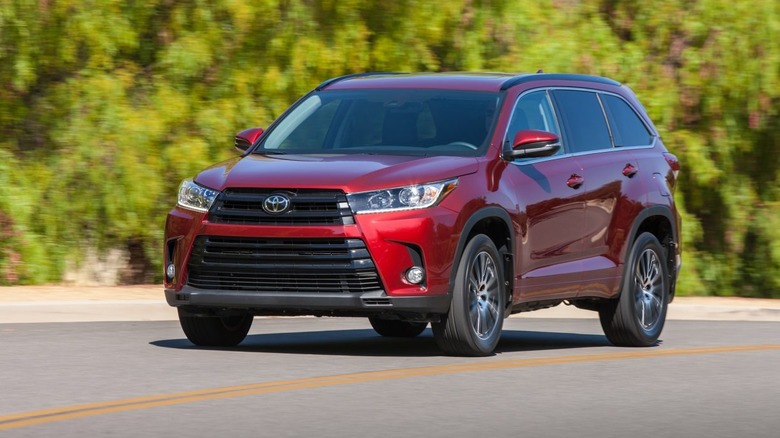The Best Years For Toyota Highlander (And Some To Avoid)
Toyota has long been one of the most popular car manufacturers worldwide. Yet when the first Toyota Highlander came out over 20 years ago, no one could have predicted it would still be popular today. With everything from better suspension to hybrid models and even a three-row option that fits full-grown adults in all rows, the Highlander has a lot going for it.
The crossover vehicle also has an impressive resale value today amid an SUV-saturated market. Toyotas seem to have great resale value, and it's not unheard of for any model to last 200,000 miles or more. As beloved as Highlanders are, however, there are some models to watch out for if you're shopping for a used vehicle.
Here are the best years for Toyota Highlander, plus some that you should avoid for various reasons. Our recommendations are based on each Highlander model's overall ratings from consumers and automotive experts, the number of recalls and complaints, and overall perceived value for the sticker price.
Best: 2015
Since the Highlander's debut in 2001, there have been four generations of Highlander. First-generation Highlanders spanned 2001 to 2007, the second generation was 2008 to 2013, and third-generation Highlanders were made from 2014 to 2019. Fourth generation is 2020 to present, and it's not expected that the 2025 Highlander will detour from the standard blueprint in any major ways.
Of course, each generation does have its differences, and third-generation Toyota Highlanders are considered some of the best. The 2015 to 2019 models have fewer recalls and fewer complaints than other years, in general (the only exception is the 2017 Highlander, which is pretty high up there in terms of the National Highway Traffic Safety Administration's recall data).
The 2015 Toyota Highlander is one of the best third-gen years because it has had few recalls and received fewer complaints than other years. The NHTSA gave the 2015 Highlander a five-star safety rating, and Kelley Blue Book's rating for the 2015 Highlander is a solid 4.6 stars thanks to its consistent feature offerings and budget appeal.
Given that a 2015 Highlander is getting up there in age, the caveats to buying one used include the possibility of poor maintenance or high mileage. Given its reputation, a 2015 Highlander is still worth it in 2024. Currently, a 2015 Highlander costs between $16,000 and $25,000, based on KBB sales listings.
Best: 2016
It's a no-brainer that other models from Toyota's third generation would also rank well, given that most models didn't try anything new or daring and instead stuck with what worked — apart from adding a third row. As a result, the 2016 Highlander earned high marks. KBB gave the vehicle a 4.5 expert rating and highlighted the addition of a tow package as a perk in 2015. The 2016 also had fewer recalls and complaints than other model years, based on NHTSA data. The three recalls were also relatively minor; a possible water leak in the windshield harness, brake fluid sensor issue, and an incorrect label were the only recalls between 2016 and 2024.
The 2016 Highlander did receive just over 100 consumer complaints, but those pale in comparison to other years, some of which have received six times as many driver complaints. The most common complaints on the 2016 model were related to brake issues and the electrical system, so drivers will want to check out their new car's service history to feel confident in buying one used. KBB listings suggest the average price for a 2016 Highlander is between $18,300 and $23,200.
[Featured image by Alexander Migl via Wikimedia Commons | Cropped | CC BY-SA 4.0 DEED]
Best: 2018
The 2018 Highlander — and specifically the hybrid model — is also a good buy with few recalls and complaints. It's not surprising given that this is another third-generation Highlander; KBB gives it 4.4 stars. 2018 didn't showcase anything new for the Highlander, so the SUV met expectations that year, too.
In 2017, the vehicle got a "refresh," as KBB called it, which might explain the awkward downtrend that year (but more on that later). By 2018, any bugs seem to have been worked out, and 2018 was an excellent sales year in the U.S. with 244,511 overall sales (14,513 of those were hybrids).
The few complaints about the Highlander in that year were related to the electrical and fuel systems. A handful of recalls (five total) focused on fuel pump issues, a possible brake issue, and potential leakage into the windshield wire harness. Given that the recalls were a few years back, most for-sale 2018 Highlanders should have had manufacturer fixes at the dealership by this point.
Depending on the package (Limited versus XLE or LE), a 2018 Toyota Highlander will cost anywhere from $16,000 to $29,000 today.
Best: 2019
The 2019 Toyota Highlander receives similarly high marks as its generation-mates; KBB gives it a 4.4-star expert rating and consumers average 4.4 stars, too. The last year of the third-generation Highlander, the 2019 model received some exterior tweaks that changed the look a bit, but not so much that you wouldn't recognize the Highlander.
This year is still a bit tight for adults in the third row, but everything else checks the boxes; the fuel economy is decent for a crossover SUV and it comes in both V4 and V6 (as well as a hybrid model). On the consumer complaint side of things, Toyota's 2019 iteration of the Highlander did receive NHTSA complaints for fuel system issues more than anything else, which makes sense considering two of the three recalls were for fuel pump issues (the third was related to a label that may be unreadable).
Compared to older model years, the 2019 Highlander is widely considered reliable and safe (NHTSA ratings are five out of five stars — side crash ratings are the highest). A used 2019 Toyota Highlander sells for $24,000 to $35,000 today.
Best: 2020
A brand-new Highlander has many features worth getting excited about, but even starting in 2020, the model became competitive. 2020 Highlander hybrids also improved fuel efficiency over prior years, with subsequent years seeing consistently high sales. For the Highlander overall, 2021 was the highest sales year ever, to date, with 264,128 models sold. That was also the highest sales year for hybrids, with 65,167 included in the overall figure.
Whether you choose a hybrid or standard 2020 Highlander, there have only been four recalls to date, with manufacturer-provided fixes at the dealership. Complaints were also relatively low to the NHTSA; the 2020 Highlander's most common complaints were related to brake issues.
To date, Toyota hasn't investigated any issues with the 2020 model, which set off the fourth generation era, but the brake issue seems to be common enough among all model years of the Highlander.
According to KBB, a 2020 Toyota Highlander will cost you between $22,000 and $39,000, depending upon mileage, condition, and package. Toyota's 2020 models included the Platinum, LE, XLE, and Limited.
Best: 2024 Grand
Toyota's newest Highlander model is in a class all its own. The 2024 Grand Highlander is massive, has tons of tech, and comes in a hybrid option. Although the Highlander got its third-row seat back in 2014, it wasn't until the 2024 Grand that Toyota finally made said row grown-up-sized. Not only that, but the stowable seats mean more cargo space in the Grand, so if you're looking for a spacious SUV with reliable features, this might fit the bill.
Both the Grand Highlander and Highlander have sought-after features in 2024, but there are differences. The Grand has more power (and a sleek look), but it's less efficient since it aims at higher performance. A hybrid is also available on both the standard Highlander and the Grand, but only the Grand comes with standard features like a wireless charging pad for your phone and built-in 12.3-inch screens.
Given that the 2024 Highlander (Grand and standard) is so new, there hasn't been enough time for recalls to slide in or complaints to stack up. To date, there are less than 40 complaints lodged with the NHTSA, with many categorized as "unknown" or "other." A 2024 Grand starts at around $43,000, while a standard Highlander starts at about $39,000.
Avoid: 2006 Hybrid
Of all the Toyota Highlander models, the 2006 Hybrid has the most complaints via the NHTSA — over 600 of them, in fact. The standard 2006 Highlander has 260+ complaints, and both vehicles were subject to recalls as well.
Highlander hybrids came out in 2005, so it's understandable that the 2006 would have so many issues that were hopefully corrected over time. Still, for a modern-day used car purchase, there's no reason to throw back this far. With four investigations from Toyota and 11 recalls, it's not surprising that consumers complained about the electrical system, brakes, and engine.
The Hybrid, specifically, received many complaints about its propulsion system. Scenarios varied, but many consumers reportedly experienced their hybrids dying while traveling at high speeds, indicating inverter failure. Interestingly, most failures seemed to happen at higher mileage (around 60,000 or more), suggesting that a used hybrid purchased today might have failed and been repaired already.
A 2006 Highlander Hybrid should cost less than $7,000 today, but that doesn't mean it's worth the investment. Given its track record, this hybrid is one to skip.
[Featured image by SsmIntrigue via Wikimedia Commons | Cropped | CC BY-SA 4.0 DEED]
Avoid: 2001-2007
The 2006 with the highest complaints is a gen-one, and since these are all older (2001-2007), this model year is a definite 'avoid.' Since 2001 was the first year of the Highlander, it's understandable that not everything was perfect. Plus, the fact that these models are nearly all two decades old means they're not ideal used car purchases these days.
Worth noting is that 2005 was the Highlander hybrid's first year on the market; while hybrids are generally categorized separately, the NHTSA combines different versions (all-wheel versus front-wheel drive, for example) when documenting issues with a specific model year. Sometimes, hybrid complaints are included with standard Highlander ones, while for some model years, they are listed separately.
The 2006 Highlander has the highest number of customer complaints for its generation, with 630 lodged with the NHTSA. The most common complaints were related to the electrical system, vehicle speed control, and brakes. With 11 recalls, for things like electrical issues and brake problems, the early Highlander may not have been the ideal purchase off the lot, either.
If you did want to buy a first-generation Highlander today, you can expect to pay between $4,000 and $12,000 — but put some cash aside for regular maintenance just in case.
[Featured image by Stephen Foskett via Wikimedia Commons | Cropped | CC BY-SA 3.0 DEED]
Avoid: 2008
Toyota's 2008 Hybrid also has hundreds of consumer complaints, while the standard 2008 Highlander doesn't fare much better. Both models have the highest number of recalls versus other year models. The 2008 hybrid has almost 600 complaints and 14 recalls, while the standard Highlander has almost 400 complaints and 13 recalls. The vehicles also don't have overall safety ratings from the NHTSA, which doesn't instill much confidence in this older-model option.
While the 2008 Highlander was previously considered one of the most reliable Toyota models, time has done a number on the older SUV's reputation. Most of the complaints for both 2008 iterations (hybrid and standard) span the vehicle's brakes, electrical system, and speed control. The hybrid also received many airbag complaints and has the highest number of Toyota investigations of any Highlander model year.
With so many other higher-rated Highlanders on the market, the 2008 iteration is one to skip. Even when it was first released, sales dipped below the previous few years and continued to decline through 2010. Price could be another consideration; you can expect to pay anywhere from $3,900 to $9,500, depending on the condition and model specifics.
Avoid: 2010
Toyota's 2010 iteration of the Highlander also had hundreds of NHTSA complaints and a long list of recalls. For the 2010 model, both hybrid and standard are lumped together with upwards of 230 complaints. Toyota also investigated three times — including twice for "steering column separation," which doesn't bode well for resale values or consumers considering the car reliable.
Most complaints relate to the electrical system and brakes, and the recalls are mostly electrical as well (though some were for labeling issues that didn't impact safety while driving). As with other models, Toyota's manufacturer communications (made available to the public by law, but mostly relevant to automotive service operations) also indicate other miscellaneous issues like buildup in the intake filter or power door "clunking." With newer models offering far more features, this used car purchase might be a headache.
The 2010 Highlander is also another instance where age is a factor. For a decade-plus-old vehicle, a price tag of $7,900 to $15,000 might be a bit much, especially given the Highlander's propensity for safety issues during that year.
Avoid: 2017
While most third-generation Highlanders get high marks, the 2017 model has many complaints via the NHTSA and quite a few recalls. Almost 200 consumer complaints and four recalls suggest the 2017 Highlander — standard or hybrid — is best skipped.
The most common complaints on the 2017 Highlander involve its electrical, fuel, and brake systems. Some issues are marked as "unknown" or "other," but even in 2024, there seem to be notable airbag issues, power train problems, and brake safety issues.
Although it's generally estimated that a Highlander can last up to 300,000 miles, dealing with all these safety concerns and possible mechanical failures might not get you there. Even though U.S. News rated the 2017 Toyota Highlander an 8.3 out of 10, highlighting its new (for 2017) engine and transmission options, those might be some of the problems with the car today. The publication also considered it "dull" in performance and handling.
A 2017 Toyota Highlander costs about $21,000 to $30,000 today, and given its history, there are likely better options on the market (Toyota or otherwise) for your budget.
Methodology
Our determinations for the best and worst Toyota Highlander years are based on the total number of consumer complaints, manufacturer recalls, and Toyota's investigations as denoted by the National Highway Traffic Safety Administration on its "Check for Recalls" page.
By way of highest-complaint ranking, many older Toyota Highlanders wound up on our list to avoid. It's worth noting that in some cases, Toyota's warranty repairs might have fixed previously reported issues.
